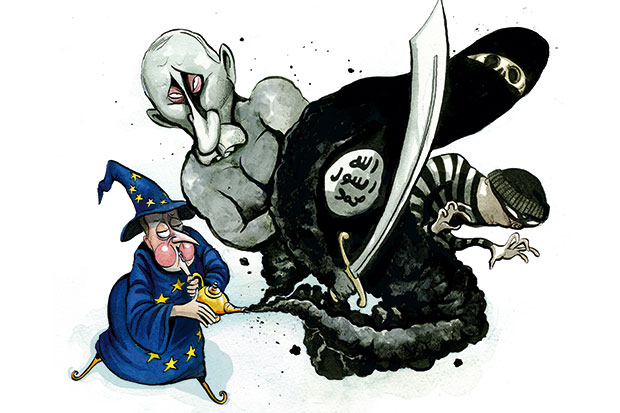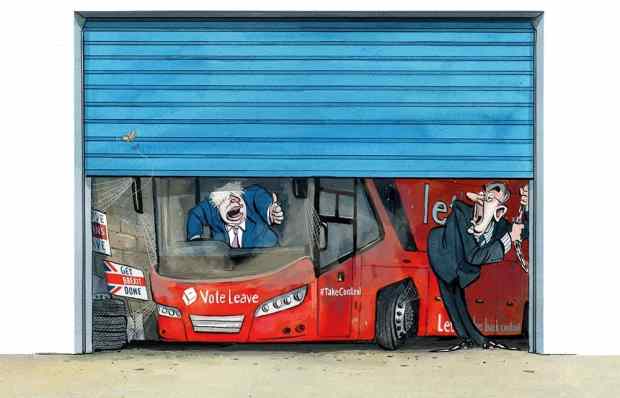The negotiations may be ongoing, but David Cameron has given up waiting for the outcome of his talks with the European Union. The Prime Minister has made up his mind: he wants Britain to vote to stay in the EU — and the campaigning has already begun. His closest allies have been assigned to the task; Downing Street is already in election mode and a strategy is being devised.
As with the Scottish referendum campaign, the In campaign will consist of vivid warnings about the dangers of voting to leave. In Scotland it was dubbed Project Fear, and that’s what Cameron is planning again. In theory, the Prime Minister has until the end of next year to call the referendum vote. In practice, he wants it over with. The polls suggest that it’s his to lose, the ‘In’ side is comfortably ahead at the moment — and the rule of thumb in referendums is that the change proposition, ‘Out’ in this case, needs to be ahead by double digits if the campaign is to win. But In’s advantage could evaporate with a new refugee crisis or a new eurozone crisis or both. Time, Cameron has decided, is now his enemy. He’d like to agree a deal, any deal, with the EU next month and hold the referendum in June — although this timetable may well slip, delaying the vote until September. The unofficial deadline has transformed government: the Prime Minister himself now never misses an opportunity to say that Britain should stay inside a reformed EU.
The campaign, though, is a little complicated for the PM. How can a self-described ‘Eurosceptic’ lead the effort to stay in the EU? How can the Prime Minister of a country whose recent success owes much to staying out of the single currency and the Schengen agreement argue that Britain must at all costs remain in the club that came up with these disastrous ideas? Many countries in Europe, whose leaders grew up in dictator-ship, cling to the EU project as the guarantor of their democracy. For most members, the European project has always been as much about geopolitics as economics. For the Poles, EU membership means a bulwark against the Russian menace; for the Greeks, it means no return to coups by colonels. But Britain has no dictatorial demons to hide from. If anything, Britain joined the then European Economic Community out of a fear of being left behind economically. When Cameron first declared his intention to hold an in-or-out referendum, he grasped this. EU membership was framed as an issue of prosperity. ‘Our participation in the single market, and our ability to help set its rules, is the principal reason for our membership,’ he said in his Bloomberg speech in 2013. But now even this argument looks shaky: given that Britain creates more jobs than the rest of the European Union put together, can he really argue that we need it for prosperity? Or that Britain, the world’s fifth — and soon to be fourth — largest economy, is somehow too small to go it alone?
This line was used in Scotland, and had some potency, given the amount of subsidy needed to balance its books, and the unanswered question about what an independent Scotland would have as its currency. But as one senior member of the government admitted in a more candid moment, the economic arguments for EU membership are now too finely balanced to be sure that they would deliver a referendum victory. So the Prime Minister has hit on one theme that does have force: whether Britain wants to go it alone in a dangerous and uncertain world. One senior No. 10 source says that this new emphasis reflects the times: ‘The rise of Isis changes arguments.’
This might sound a little incongruous. Traditionally, the British have regarded the EU as an economic arrangement, with security the preserve of the Nato alliance. When the EU was awarded the Nobel Peace prize in 2012, Cameron didn’t even bother turning up to the ceremony, sending Nick Clegg instead. Not content with that snub, the Prime Minister went out of his way to stress that Nato deserved the prize as much as the EU. But things have changed. One senior member of the government sums up the case for remaining like this: ‘Who’ll be happiest if we vote to leave? Vladimir Putin. Do we want that?’
But will we buy that? The Foreign Office thinks so. They were struck by the way support for EU membership went up after Putin’s annexation of Crimea. This (it is argued) shows that voters ‘get’ that Russian aggression in Eastern Europe means that the liberal, democratic nations of Europe need to gather together. But does one necessarily follow on from the other? Ultimately, Europe’s security is underpinned by a country that isn’t a member of the EU: the United States of America. When Poland’s Foreign Minister suggested that Warsaw could accept Cameron’s proposal for a four-year ban on in-work benefits for EU migrants in exchange for greater protection against the Russian threat, what he wanted was Nato bases — not the deployment of an EU Rapid Reaction Force. Yet this argument is more than just a campaign tactic. One government minister tells me: ‘Putin sees Brexit as weakening any effective system of European and transatlantic co-operation.’
This is a view shared by the US administration. Indeed, Barack Obama is expected to visit the UK this spring — his farewell tour — and the hope in government circles is that he will again make clear that he would like Britain to stay in the EU. While US presidents have always wanted this (mainly to improve the quality of the EU), Obama’s benediction would be used to make a separate point: that there is no conflict between the ‘special relationship’ and EU membership; that the leader of the free world wants Britain inside the EU for the sake of western security.
And how about the Islamic State? Does it also want Brexit? The Prime Minister would never be as crude as to even suggest this, but he does seem adamant that the terrorist threat strengthens the case for staying in the EU. Before Christmas, he told the editor of this magazine and me that jihadism meant that the EU needed a stronger external border, which Britain could help reinforce. He wanted a ‘better exchange of information’ because ‘it’s no good simply sitting behind your own borders if you don’t know which people are coming into which European countries. If you can’t check them against your own warnings list, then you’re not safer.’
He was rehearsing the argument we can expect to hear a lot of on the campaign trail: that Britain has better protection against Islamic terrorism as part of the EU. This wasn’t quite the French experience: Europe’s lack of borders made the Isis route to Paris all the easier, and border controls have been springing up all over the continent ever since the Bataclan attacks. What’s more, co-operating with other countries against terrorism hardly requires them to be members of the EU: Britain’s closest intelligence partners are the ‘Five Eyes’ of the US, Australia, Canada and New Zealand. Equally, it is hard to believe that Brexit would end the close and mutually beneficial intelligence relationship between the British and French security services which, as John Scarlett has pointed out, has worked well for a century.
But co-operation against the terrorist threat, and organised crime, will nonetheless be one of the arguments advanced for staying in the EU, and this might be more effective than the Out campaign expects. It’s worth remembering that the one time Nick Clegg got the better of Nigel Farage in their EU debates in 2014 was when he claimed that leaving the EU would make life easier for paedophiles and other criminals.
Security is the new Tory buzzword. The s-word was even invoked in the Prime Minister’s speech on poverty and family values this week: there is barely a Tory proposal that isn’t sold as a way to make us safer. Why? Because the Tory high command remain captivated by Lynton Crosby’s insight that security is what voters crave most. Crosby himself might have declined to get involved in this referendum campaign, but one government source says that it will be ‘Lyntonesque’.
One the biggest risks to Cameron’s security strategy is Theresa May. If the longest serving home secretary for more than a century were to declare herself an ‘outer’ on the grounds that being in the EU makes Britain less safe — backed by Liam Fox, Cameron’s first defence secretary — it would blow a big hole in the government’s case. But no one knows on which side Mrs May will come down: she seems to be the only person in Westminster who is actually waiting to see what the final renegotiated deal looks like.
Of course the Out campaign, Vote Leave, is very happy to have a fight about security. They argue that when it comes to terrorism, voters view Europe as a hindrance rather than a help. Strasbourg and EU law have repeatedly made it more difficult to extradite those accused of supporting terrorism: look at how long it took Mrs May to put Abu Qatada on a plane to face terror charges in his native Jordan. To the Out campaign, security is the very best reason for voting to reclaim sovereignty: voters, they say, would prefer Britain to take control of its own security rather than trust in EU co-operation. And if leaving the EU means tighter border control, surely that will make us more secure?
What the Brexit campaign fears most is that worries about the short-term economic impact of leaving will come to dominate the campaign. Will there be years of uncertainty as Britain negotiates a new deal, not only with the EU but with every other country that the EU has a trade deal with? Will firms stop investing in the UK until they know what the new relationship will look like? As one of the key members of the Vote Leave campaign warns: ‘If economic fear dominates, it will swamp everything else.’
This is where Project Fear comes in, and the PM’s bloodcurdling warnings about the dangers of leaving. Senior strategists are unapologetic about this. The Liberal Democrats on the campaign, who were hit hard in the election by Tory warnings about the dire consequences of a Labour/SNP coalition, are determined to use the tactics that were deployed against them to such devastating effect. Even Nick Clegg has given his blessing to adopting this approach. ‘Fear of the unknown is a powerful — and legitimate — emotion,’ he wrote recently.
Andrew Cooper, the senior Tory on the campaign, won’t be bothered by accusations that this is Project Fear, given his involvement in the Scottish referendum. He is a proud and unashamed defender of the Better Together campaign. He vigorously rebuts any suggestion that it was too negative.
And for good reason: negativity works. The challenge for the Out campaign is to try to find a way to neutralise these toxic attacks. One option gaining favour is proposing a second referendum, so voters can see the final terms of exit should Britain decide to leave. This may encourage more to vote Out first time around. But Downing Street is confident that it can crush the idea of a two-vote referendum by saying that, if Britain votes out, Cameron will invoke Article 50 — the formal and irreversible two-year process by which a country leaves the EU. To re-inforce this point, other EU leaders will make it clear that a vote to leave will mean precisely that. (Though given how disastrous Brexit would be for the whole European project, and the EU’s habit of making countries vote again, these warnings will not be entirely credible.)
Both sides in the referendum campaign want to paint themselves as the safer choice and to warn of the risks of the other approach. This is not a vote that is going to be won by an appeal to the better angels of our nature.
So for a country that is used to discussing Europe in relatively cold economic terms, the nature of this referendum campaign will come as a surprise. And if the British vote to stay in the EU for security reasons, it will show that we have become that much more European in recent years.
Got something to add? Join the discussion and comment below.
Get 10 issues for just $10
Subscribe to The Spectator Australia today for the next 10 magazine issues, plus full online access, for just $10.
You might disagree with half of it, but you’ll enjoy reading all of it. Try your first month for free, then just $2 a week for the remainder of your first year.















Comments
Don't miss out
Join the conversation with other Spectator Australia readers. Subscribe to leave a comment.
SUBSCRIBEAlready a subscriber? Log in